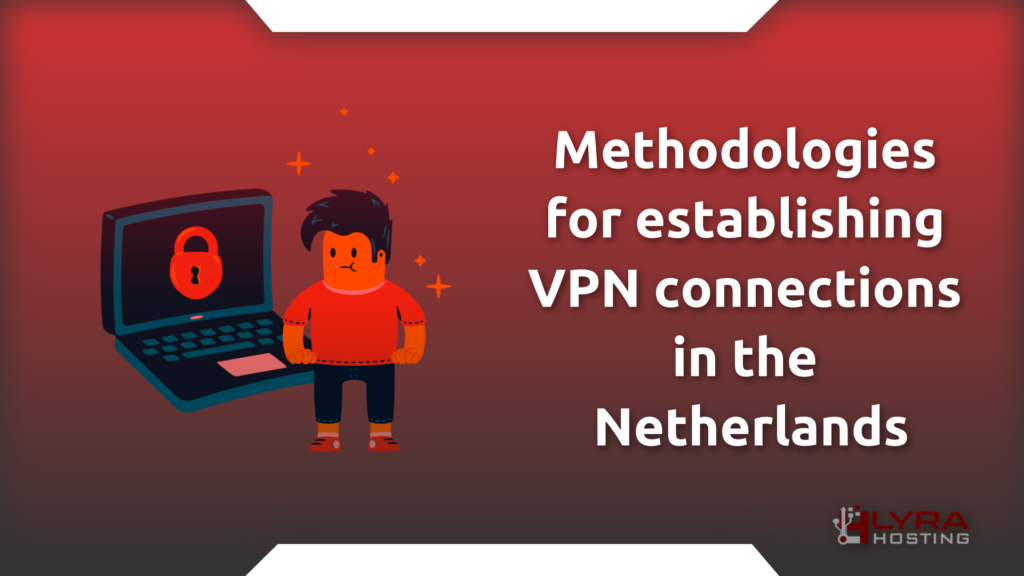Methodologies for establishing VPN connections in the Netherlands

Introduction
Your gadgets and the world wide web are protected by using a VPN service. It protects your online privacy by securing all data sent from your computer to the internet and creates an encrypted tunnel between your computer and the online web by encrypting it.
Types of VPNs
VPNs may be classified as either remote access or site-to-site.
1. Remote Access Virtual private network (VPN)
Users can join a secure network through a VPN and utilize its resources from a distance. A user’s link to the internet is created to access the private network, giving a safe and private means of browsing the internet.
Remote access to data and resources is also made possible through a secure connection to the company’s private network. Enhance internet confidentiality, dodging regional Internet limitations, and accessing prohibited websites are some of the most common uses of virtual private networks.
2. Site-to-Site Virtual private networks
This kind of VPN, also called Router-to-Router VPN, is most often employed by large organizations. Using a site-to-site VPN, a company’s server may be linked to another server in a separate geographical region.
Site to Site Virtual private networks come in two varieties:
An intranet is utilized whenever a Site-to-Site Virtual private network is being used to link many workplaces within the same company.
Using an extranet-based VPN, many enterprises may securely exchange data and resources.
To enable secure and confidential communication between remote offices, site-to-site VPNs create a link between networks at those locations.
Types of Virtual Private Network Protocols
Various features and degrees of protection are offered by the various VPN protocol options, which will affect how data is carried through a connected VPN network. Bandwidth utilization rate is a priority for certain VPN protocols, while encrypting or disguising data packets for online privacy and protection is more important for others. Listed below are the many kinds of VPNs:
1. Securing the internet’s protocols (IPSec)
Communications over an Internet protocol may be secured using the IPSec protocol. It encrypts and validates every data packet transmitted and received over the Internet Protocol (IP).
Using the IPSec protocol in both transport and tunneling modes is possible. Only the message inside the data packet is encrypted using the transport mode, but the tunneling method encrypts the complete data packet in both cases.
2. Tunneling Protocol for Layer 2 (L2TP)
When combined with some other Virtual private network cryptographic system, such as IPSec, Layer 2 Tunneling Protocol (L2TP) produces a powerful protected Vpn service. When two L2TP connections are established, L2TP establishes a tunnel between them protected by the IPSec protocol.
3. OpenVPN
If you’re looking for an easy and open-source VPN service, OpenVPN is the best option. SSL and TLS are used to provide a standard security method.
4. Protocol for Point-to-Point Tunneling (PPTP)
The Point-to-Point Tunneling Protocol (PPTP) is one of the first and most extensively used Virtual private network systems. One of the most used protocols for creating a tunnel is the PPTP (Point-to-Point Tunneling Protocol). For consumers who don’t need many encryptions, the Point-to-Point Protocol (PPP) encrypts the data as it travels within the endpoints.
5. TLS and SSL
When using SSL or TLS, a virtual private network (VPN) is established between the client and server. Only selected programs can be used by the web browser rather than the whole network. As long as internet connections are connected to SSL and TLS, the user does not have to do anything to switch to SSL.
6. Secure Shell (SSH)
Using Secure Shell (SSH), data is exchanged through a secure virtual private network. Connecting a regional channel to a distant site via an encrypted channel is made possible by an SSH client.
7. Lyra VPN
To ensure the safety of their internet communications, VPNs (virtual private networks) are available. Neither ISPs nor governments can see what customers might be doing in the channel. Lyra VPN is an excellent option if you seek a secure and private VPN. Utilize our confidentiality VPN to safeguard your Internet traffic whether utilizing open Wi-Fi networks, operating on the go or if you want to remain anonymous when browsing the web.
At Lyra VPN, we have many different plans to cater to your need. Along with the monthly and yearly packages, we also have a dispensable 3-day package that only costs €1.99.
The monthly package costs €5.99 while the yearly package costs €49.99. These have all sorts of features required, such as OpenVPN, P2P and torrents, unlimited bandwidth, and fully encrypted.








